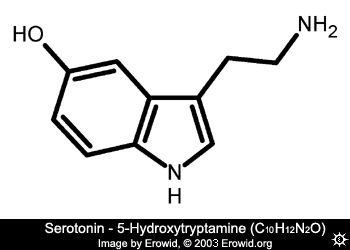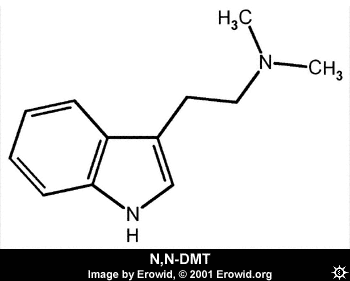|
Is it possible to take a serotonin pill to increase your brain's amount of serotonin?
| Q: |
Is there a such thing as a serotonin pill? Instead of taking MDMA, which makes you feel good because it lets all of your serotonin out, is there something that would put serotonin in your brain without releasing any of your own? Antidepressant pills like Zoloft and Prozac only try to correct chemical imbalances, they don't add serotonin. There are certain foods that can increase serotonin, but is there something that will have an ecstacy like effect, without taking ecstacy, or without releasing your own serotonin? Is it possible to extract pure serotonin from somebody to use on somebody else? If it were possible to extract serotonin, would it have the same effects on other people, or would serotonin from one person be incompatible with another person? |
|
| A: |
First, to answer the question of whether it is possible to extract serotonin from someone else, one needs to understand a little about the chemical serotonin. Serotonin is a relatively simple molecule (compared to proteins and other "macromolecules" that can have unique structures between individuals). The serotonin in your brain is exactly the same as the serotonin in your blood and the serotonin in other people. Just about all the small molecules, and even many of the proteins (with some exceptions or minor deviations), are exactly the same between one individual and the next.

To answer the question about whether taking a "serotonin pill" would cause effects like those of MDMA, there are three main points I'll address. The first is that much of the serotonin that is ingested will be broken down by the metabolic enzyme MAO. The second point is that even if large quantities of serotonin were to survive the MAO metabolism, it would not directly increase serotonin levels in the brain. The third part of the answer is that simply increasing serotonin levels does not lead to MDMA-like effects.
Serotonin, as a molecule, has two particular characteristics that makes it unlikely to be able to be taken orally and reach the brain with a significant concentration to cause a noticeable effect. A key characteristic for this type of molecule is how the nitrogen dangling off the end (see the structure link above and look for the N that is not in the ring structure) behaves with respect to the number of hydrogens that is bound to it and the electrical charge it has (positive or neutral) depending on its environment. The so-called "terminal nitrogen" (on the end) is a base and will change its state (three hydrogens/positive charge vs. two hydrogens/neutral charge) depending on the pH of the solution it is in (acid/base chemistry). At any given time, in most physiological environments (stomach, blood, inside cells, etc.), most serotonin molecules will be positively charged.
Now, to get into the brain, molecules have to pass through a layering of cells that surround the brain's blood vessels commonly referred to as the "blood-brain barrier". These cells, as with all the cells in your body, have a membrane made up of fat-like, hydrophobic (water-disliking), "non-polar" chains of molecules stacked up on each other (a bi-layer). While the outside and inside of this membrane bi-layer is hydrophilic (water-liking), charged, and/or "polar", in order to pass into the cell(s) and/or through the membrane(s), a molecule has to pass through this fat-like region. If the molecule itself is charged or has any groups on it that are water-liking/polar, this is unlikely to happen. Think of trying to push a droplet of water to the bottom of a cup of oil with a fork. It can also be thought of as having to get the chemical to dissolve in the fat-layer to get through it: charged / polar chemicals simply will not "dissolve" and pass through this layer.
There are 'active transporters' or 'active carriers' that act as gateways through the blood-brain barrier for molecules of particular shapes. The normal amino acids (building blocks for the neurotransmitters) such as tryptophan, phenylalanine, tyrosine, etc get through the BBB by having special systems for pushing them through. As a side note, there are fewer of these transporters than there are possible molecules and the same transporters work on many different chemicals, so there is competition for transport into the brain between different chemicals, however this does not really impact the question at hand.

There are drugs, however, such as psilocin or N,N-DMT, are very similar to the structure of serotonin that we know get into the brain just fine to do their dirty work. So how is it that these or other drugs with a nitrogen dangling off the side, that probably have acid/base chemistry characteristics similar to serotonin's, manage to make it into the brain? This is both complex and simple.
For the complex aspect, we must return to our discussion of the molecules passing through the blood-brain barrier. When I said that most of the molecules will be positively charged, this means that some of them will not be. In fact, the molecules will be constantly changing their state, with most favoring the charged/extra hydrogen state. The uncharged molecules have a much better chance of making it through the membrane(s) and into the brain. If we look at the molecules outside the blood-brain barrier, when some molecules get through the membrane, the acid/base chemistry dictates that the same ratio of charged:uncharged molecules must remain. So the molecules continue to dance back and forth between charged and uncharged, with some of the uncharged molecules passing through the membrane, the overall number of molecules outside the brain slowly decreasing, and the number inside slowly increasing. But the ratio of charged:uncharged molecules always remains the same (both inside and out). Thus, depending on the other groups on the molecule, and the concentration of the molecule in the blood, you will have a "slow" trickle of the molecule into the brain. This holds true for both the active transport and diffusion models.
This brings us to the simple aspect of why other drugs are able to have an effect, and the second characteristic of serotonin that makes it unlikely to have an effect. This is the fact that it takes a relatively large number of serotonin molecules to do its normal operations and a whole lot more to contribute to unique effects like those seen with drugs such as MD(M)A. Other drugs require a much smaller total number of molecules to produce their effects, so not as many need to get into the brain. These similar drugs probably get into the brain about as well as serotonin, but the drugs cause more of an effect at the concentrations that make it into the brain: very small amounts of MDMA (for instance) cause large changes in serotonin levels and other changes in brain activity. Furthermore, these drugs often have additional groups, particularly on the "terminal nitrogen", which slow the ability of MAO to break them down, thus allowing more to be in the blood.
Finally, even if taking a "serotonin pill" would increase brain levels of serotonin substantially, the effects would not be similar to MD(M)A. It's not just the serotonin release that causes MD(M)A to have its effects. MD(M)A causes complex changes to the activity of some 'serotonin neurons' (although these receptors also have receptors for other neurotransmitters) and MD(M)A also causes short term changes in norepinephrine, dopamine and other neurotransmitters and neurons. Chemicals that are more pure serotonin releasers (target serotonin more narrowly, such as MMAI) are not "fun" and there are chemicals that cause much stronger releases of serotonin than MDMA that have effects nothing like MDMA. Other chemicals, such as MBDB have effects similar to MDMA, yet have been shown to cause less serotonin release. Although it is common to read or hear about how Ecstasy causes its interesting effects through triggering a release of serotonin, the effects of MDMA and the SSRIs like Prozac are far more complicated than this overly simplistic explanation.
This is not to say there would be no effect at all of raising serotonin levels in the brain. In some people (but not all), taking serotonin precursors such as 5-HTP can cause a mild mood lift, but higher doses are associated with nausea and the effects are not all like MD(M)A. Some people experience increased anxiety, instead of less, when taking SSRIs and high doses of 5-HTP, so increasing levels of serotonin does not always improve mood. L-Tryptophan is the essential amino acid present in some foods that is the 'normal' precuror to serotonin and a balanced diet can help keep serotonin at healthy levels.
To summarize, the reason other drugs such as MDMA or Prozac are orally active (and oral serotonin is not) is that they reach the brain, they are more potent, and their effects in the brain are far more widespread and complicated than simply increasing serotonin levels.
aloha
psilo |
|
|
|
|
|
Categories:
[ Pharmacology ]
[ MDMA (Ecstasy) ]
[ Serotonin ]
|
|



